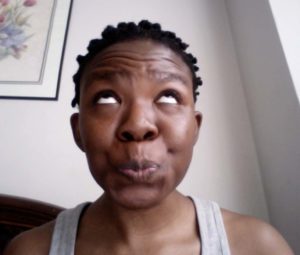In places where the majority is either a little lighter, darker, or the same color as you, no one calls you “color.” You are often something else: Akan, Ga-Adangbe, Ewe, Hausa, etc. Growing up, I was a silly child. My brothers still tell stories of how I would bite anyone who pissed me off. My Nana and her friends called me
Akwɛ (monkey). It was a compliment and I loved it, still do. When I went to school I used to run with the boys and fight them, too. Then one day I became the girl who spoke funny, walked funny, and read too much. I was fitted for glasses and became Four Eyes. In boarding school I was Jane Strange, then Animal Dancer. I had never been black. I had always been phases or versions of myself.
They say, subtly or not, in books, in music, on TV, radio, the streets, in looks, body language that black people (particularly, Black Americans) cannot be trusted because they are “color.” They are bitter, angry, and lazy. They are violent, dirty-mouthed, have zero self-respect, and don’t know what it means to be in possession of self-respect. They are sinister and only interested in drugs, alcohol, and welfare. Their women are loose and sleep with every Tom, Dick, and Harry; get knocked up every other second. Their men are mean, they beat you up until you see the devil––a replicate of themselves. They are a loud people who cannot even speak proper English, not even standard American English. A classless people, really. There is nothing that can be done for them, or about them. A hopeless case of inferior people.
Africans, on the other hand, are dirty, ugly, and all dying of HIV. Once, I liked an HIV prevention page on Facebook and my mate asked if I knew anyone with the disease. It was a curious question. But from the way she looked at me, I felt as though she was asking if I had the disease.
Africa is a poverty ridden country and her children are reduced to living skeletons stalked by vultures. It is no wonder her inhabitants scurry to the west with every little opportunity (just like I did to the US).

Africans are pagans and cannibals too. I just finished Anderson’s Fairy Tales. Have you read the “Professor and the Flea”? Africans sleep in the mud or in trees and go about naked hooting like animals. Oh, and they all have this particular wild smell. Once a girl inquired why I did not have that distinctive African smell. At that point, I thought I had heard it all. I was wrong. But I was more amused than insulted. It is something to have had such respect for a group of people because you were taught that they were all high thinkers and in possession of good intellect. But you wake up in their midst and find a ridiculous amount of them filled to the brim with nonsense, and opinions and myths formed in sheer ignorance which are expressed quite pompously. It begs the question, who is spreading these tales and why? But perhaps the answer lies here: how are these stories told and who/what do they benefit?
It started becoming clear to me that I am Black when I realized that the definition of a Black person is not the Black American, like I had thought. It is the African descendant. Hence it matters not if you are Ghanaian, American, or Jamaican. It is about your heritage. It is about the caucasian bringing Christianity to the savage world, and when in need of free manpower having those savages loaded onto ships, off to civilized countries to be sold like donkeys and worked like mules. It is about having been defined as less than human, and having that status raised to inferior people. It is about having been written about, for so long, in foreign languages and by foreigners with different skin colors and cultures. How is it that the victimized is portrayed as evil––even in their own eyes––and the perpetrator as angelic and godly? Such sophisticated brainwashing!
The world speaks European languages. The world does not speak African languages. This has a lot to do with things. When others have the power to define you, and tell your story, they tell it as it suits them. The stereotypes behind Blacks today are what I like to call a poor translation. As Norma Cole pointed out, a translation does not carry with it the culture and tradition of a people. Therefore, a translation communicates in regards to the culture it is transferred into and thus comports itself by such standards. It is the more damaging when the translation is also intentionally skewed to merit a particular group of people.
Imagine a world where the definition of a beautiful person is dark skin and puffy cotton-like hair, in writing about a people of pale skin and non-cotton like hair, I think, I, too, might have translated those features, exotic. Yet, it is no excuse how far the west has gone in portraying Blacks. It is so well done that even in nations where everyone is Black, some of us still feel that a pale skin is the standard of beauty and that which is good. There is also the fact that many Black people are brought up in Christian homes: to look to the cross and see Jesus can and does a lot of damage. It establishes or supporting an inferiority complex.
I did not learn anything significant about slavery in Ghana. All I now know, I learned in the USA. It has explained so much that I have stopped saying why cannot they just forget the past and move on. I was ignorant of the Black American history and what it means to be the unwanted minority.
I have accepted the label of Black but not with the definition that I was once given. Black to me is more political, like say, a feminist. I am Black in that I share a particular trait and origin with a race, but none of us are limited to this: to our complexion.
For many years the story of people who look like me were told by others who did not look like us. We were translated, and often in such ways that discredited us. When we came into these languages that translated us, we tried to fit into the culture that wrote of us, we tried to follow their standards of beauty, become like them because being Black was not good enough. But it is. It is GREAT enough.
Thus I will learn more about my race and help share its story, help define us in lights of our own traditions and cultures. Not as a comparison to another race. In general we are a great people of high intellect and feelings: some of us are awesome and some of us are awful. Though we have been tripped and hurt so many times, we keep getting up and fighting for what we should not even have to fight for, the right to be treated as the human beings we are. I will teach my language and explain my culture. I will share my pride and love of who I am, and not have others spit on where I come from or the colors of my heritage.
I have always known, within every pore on my skin, that our skin colors are exciting and wonderful. This does not mean that other skin colors are not cool, too. But if I should die and come back again, I’d love to keep the color. It’s worked very well for me. This skin color makes me bold and it is that which makes me at home in nature and in this world. I love that I can be fully swallowed by the night; that even in the light, you need to come closer to really see me––a literal metaphor. I will stand up for my race and not be quiet when others treat us unfairly because of our colors.
It is my belief that racism will not always be a problem. I am certain that a day will come when we will be known by the phases and versions of our individuality and the term that will apply to us is not Black, Asian, White, Indian or other, but a race of individuals which together form humanity. Until then, I will exercise my power as an individual of a certain race by telling my own story, and the love I have for who I am and with those that identify as Black people.
—
J. A. Odartey



